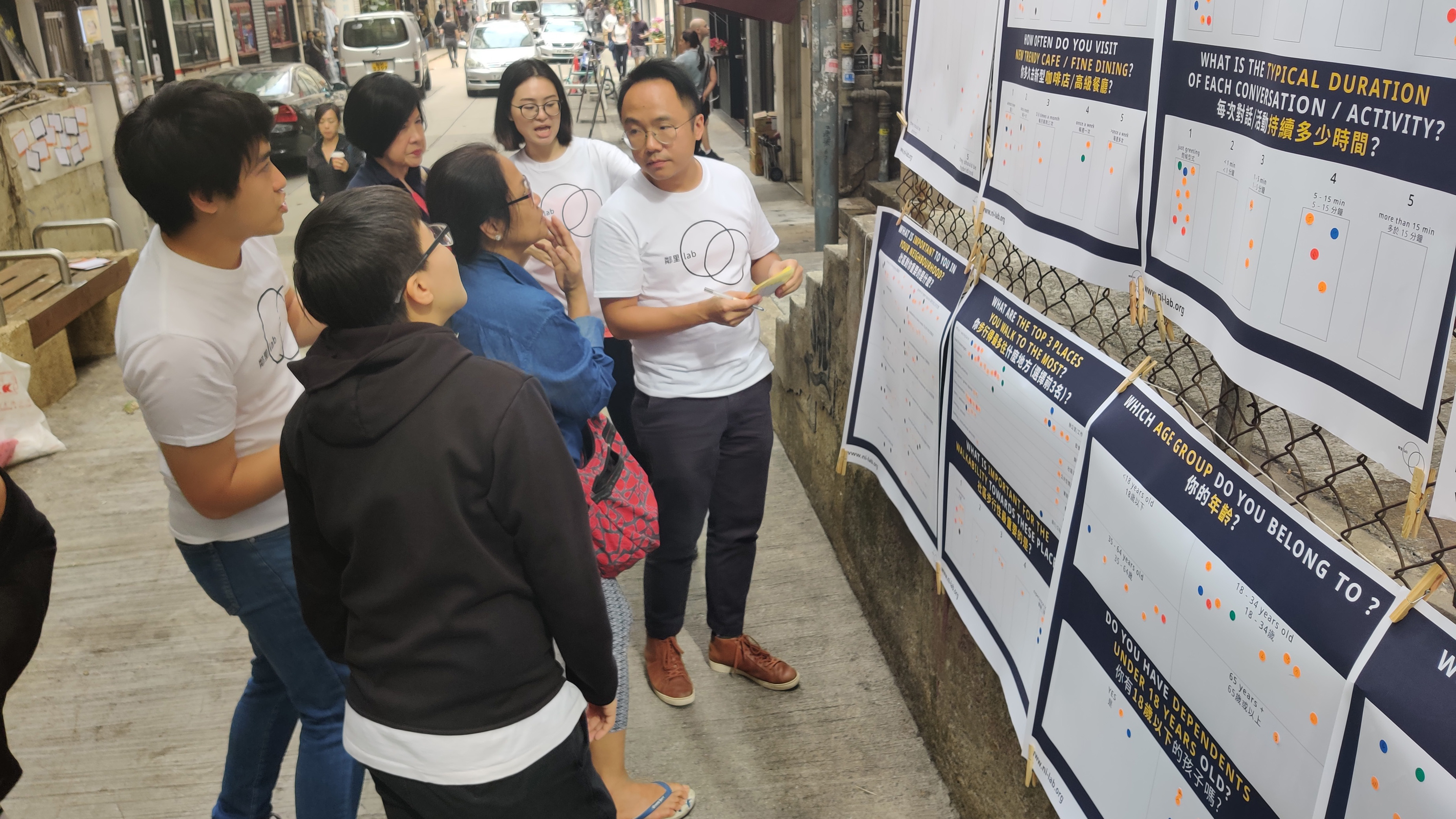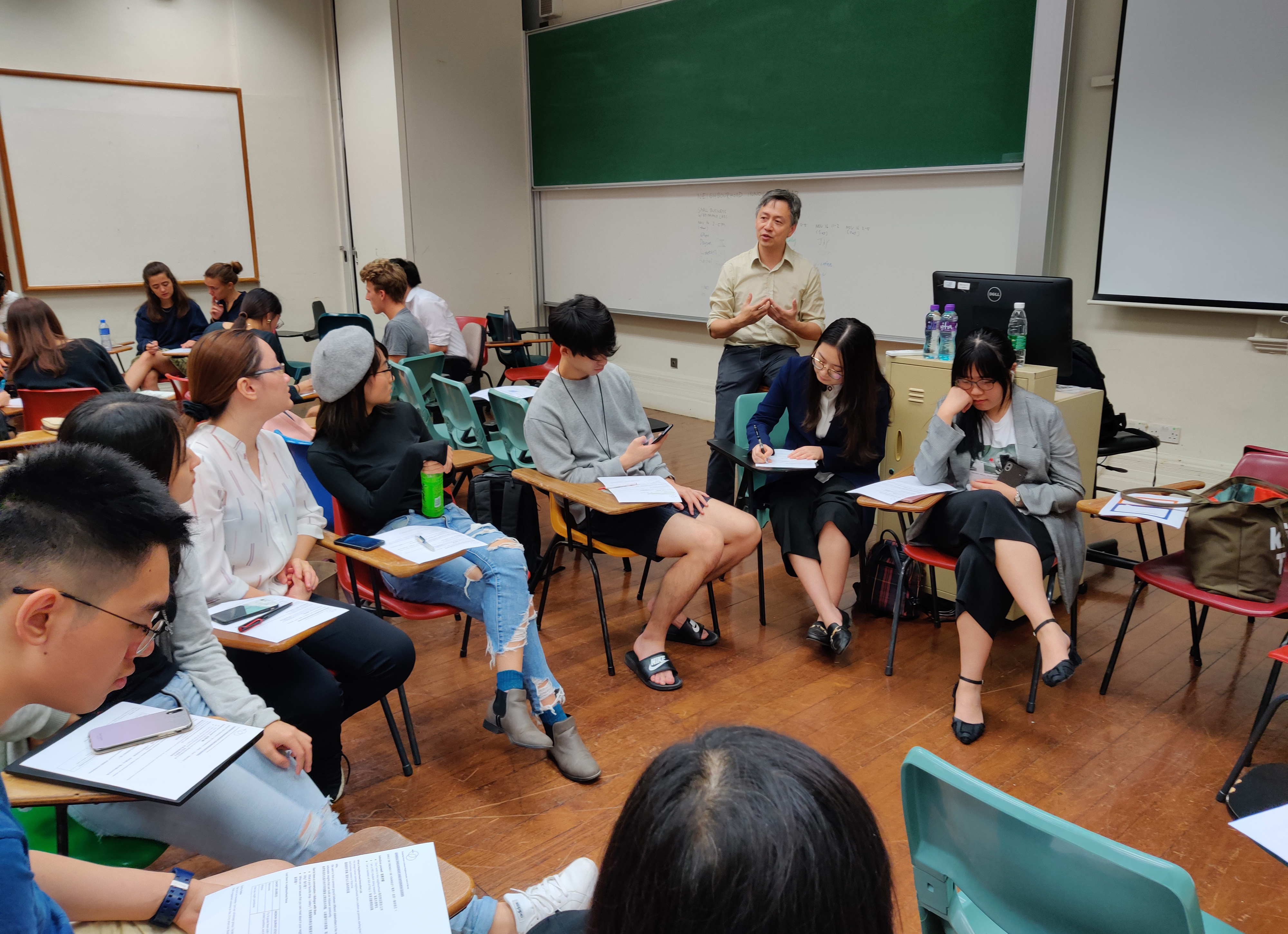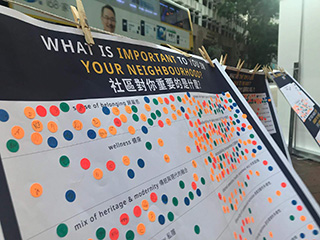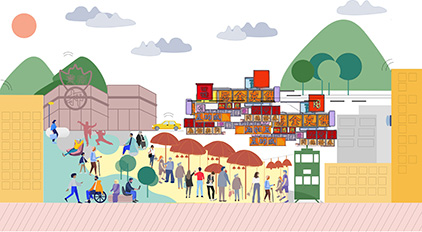11 January 2021
Hong Kong is such a densely populated city with so little land and so many people that residents and shop owners commonly argue who has the right to use certain public spaces and how these spaces should be used. This issue has caught the attention of Eric Ho, Founder of Architecture Commons, a design agency for urban innovation located in Wan Chai.
In 2019, Ho launched the concept of Neighbourhood Innovation Lab in Wan Chai as the starting point to address the problem. Along with a team of professional architects, Ho set up street polling stations, much like those used by by district councillors. They also conducted focus groups and carried out one-on-one interviews with different stakeholders of the community in an effort to understand the true needs of the neighbourhood.
At polling stations located along the bustling streets of Wan Chai, the Neighbourhood Innovation Lab group displayed a series of questions about what was important to the community on beautifully designed cardboard displays. They also asked passers-by to write down their expectations and experiences of the neighbourhood.
“One resident reminded us to carefully use a specific stool as the manufacturer had spent thousands of dollars and countless nights to put it together. Another resident told us how he missed the taste of ‘toilet congee’, which had earned its name because it was sold near a public restroom on a local street. Surprisingly, it tasted delicious.”
Some would air their grievances to Ho. “There used to be a lot of light industry on Sun, Moon and Star streets. But now the neighbourhood has turned into a café and bar zone. The residents upstairs complain about the noise that party-goers make, and shop owners are often offended when cars park in front of their entrances and occupy their business space. There is a lot of dissatisfaction in such a small community.”
In the role of mediator, Ho gathered a variety of insights and data from the neighbourhood and presented the information to the government and property developers. “We suggested a pedestrian zone and asked the developer to move away certain facilities to create more public spaces”, he said. “Hopefully this could ease the tension between people and transport.”
In a little more than a year’s time, Neighbourhood Innovation Lab was extended to cover North Point and Central. The next station will be Tsuen Wan, Hong Kong’s first new town in the New Territories. Though there are two MTR stations in the district, Yeung Uk Road appears to be the division between the old Tsuen Wan, where clusters of old tenement buildings are found, and the modern Tsuen Wan, where the 89-storey Nina Tower stands.
Nina Tower has long taken into account the needs of the visually impaired and people with disabilities. Tactile guide paths were therefore built to connect the mid-floor of the second phase via an elevated walkway network to other major destinations, such as Parc City, Citywalk 2, Yeung Uk Road Market and Tsuen Wan West MTR Station. These passages were built at least 1.05 metres wide for wheelchairs to pass through and must be flat and free of obstacles, fitted with guardrails and handrails on both sides.
On the ground floor of NINA MALL, a piazza welcomes people from all walks of life. Sadly, some grass-root families of the area do not feel comfortable entering the piazza because they don’t believe the upscale mall welcomes them.
When Neighbourhood Innovation Lab learnt that some did not feel comfortable at the NINA MALL piazza, they recruited different stakeholders and created a team of Corporate Fellows to tackle the problem. They were asked to attend training sessions regularly for four months and explore possibilities of making Tsuen Wan an inclusive neighbourhood.
“A lot of fellows are living in Tsuen Wan. They are very passionate about the neighbourhood and really want to do something to enhance the community”, said Ho. “They suggested holding a flea market at the piazza that different stakeholders can operate together. They also considered putting some performances together with the hope that artistic elements can tear down the walls that used to separate people apart.”
At present, there are plans to turn Nina Park into an inclusive destination for the Tsuen Wan neighbourhood. To achieve this goal, Chinachem Group is seeking public opinion and encouraging community engagement and participation to create a better place for the stakeholders.
In 2019, Ho launched the concept of Neighbourhood Innovation Lab in Wan Chai as the starting point to address the problem. Along with a team of professional architects, Ho set up street polling stations, much like those used by by district councillors. They also conducted focus groups and carried out one-on-one interviews with different stakeholders of the community in an effort to understand the true needs of the neighbourhood.
At polling stations located along the bustling streets of Wan Chai, the Neighbourhood Innovation Lab group displayed a series of questions about what was important to the community on beautifully designed cardboard displays. They also asked passers-by to write down their expectations and experiences of the neighbourhood.
“One resident reminded us to carefully use a specific stool as the manufacturer had spent thousands of dollars and countless nights to put it together. Another resident told us how he missed the taste of ‘toilet congee’, which had earned its name because it was sold near a public restroom on a local street. Surprisingly, it tasted delicious.”
Some would air their grievances to Ho. “There used to be a lot of light industry on Sun, Moon and Star streets. But now the neighbourhood has turned into a café and bar zone. The residents upstairs complain about the noise that party-goers make, and shop owners are often offended when cars park in front of their entrances and occupy their business space. There is a lot of dissatisfaction in such a small community.”
In the role of mediator, Ho gathered a variety of insights and data from the neighbourhood and presented the information to the government and property developers. “We suggested a pedestrian zone and asked the developer to move away certain facilities to create more public spaces”, he said. “Hopefully this could ease the tension between people and transport.”
In a little more than a year’s time, Neighbourhood Innovation Lab was extended to cover North Point and Central. The next station will be Tsuen Wan, Hong Kong’s first new town in the New Territories. Though there are two MTR stations in the district, Yeung Uk Road appears to be the division between the old Tsuen Wan, where clusters of old tenement buildings are found, and the modern Tsuen Wan, where the 89-storey Nina Tower stands.
Nina Tower has long taken into account the needs of the visually impaired and people with disabilities. Tactile guide paths were therefore built to connect the mid-floor of the second phase via an elevated walkway network to other major destinations, such as Parc City, Citywalk 2, Yeung Uk Road Market and Tsuen Wan West MTR Station. These passages were built at least 1.05 metres wide for wheelchairs to pass through and must be flat and free of obstacles, fitted with guardrails and handrails on both sides.
On the ground floor of NINA MALL, a piazza welcomes people from all walks of life. Sadly, some grass-root families of the area do not feel comfortable entering the piazza because they don’t believe the upscale mall welcomes them.
When Neighbourhood Innovation Lab learnt that some did not feel comfortable at the NINA MALL piazza, they recruited different stakeholders and created a team of Corporate Fellows to tackle the problem. They were asked to attend training sessions regularly for four months and explore possibilities of making Tsuen Wan an inclusive neighbourhood.
“A lot of fellows are living in Tsuen Wan. They are very passionate about the neighbourhood and really want to do something to enhance the community”, said Ho. “They suggested holding a flea market at the piazza that different stakeholders can operate together. They also considered putting some performances together with the hope that artistic elements can tear down the walls that used to separate people apart.”
At present, there are plans to turn Nina Park into an inclusive destination for the Tsuen Wan neighbourhood. To achieve this goal, Chinachem Group is seeking public opinion and encouraging community engagement and participation to create a better place for the stakeholders.

Eric Ho (right), Founder of Architecture Commons, a design agency for urban innovation based out of Wan Chai.


